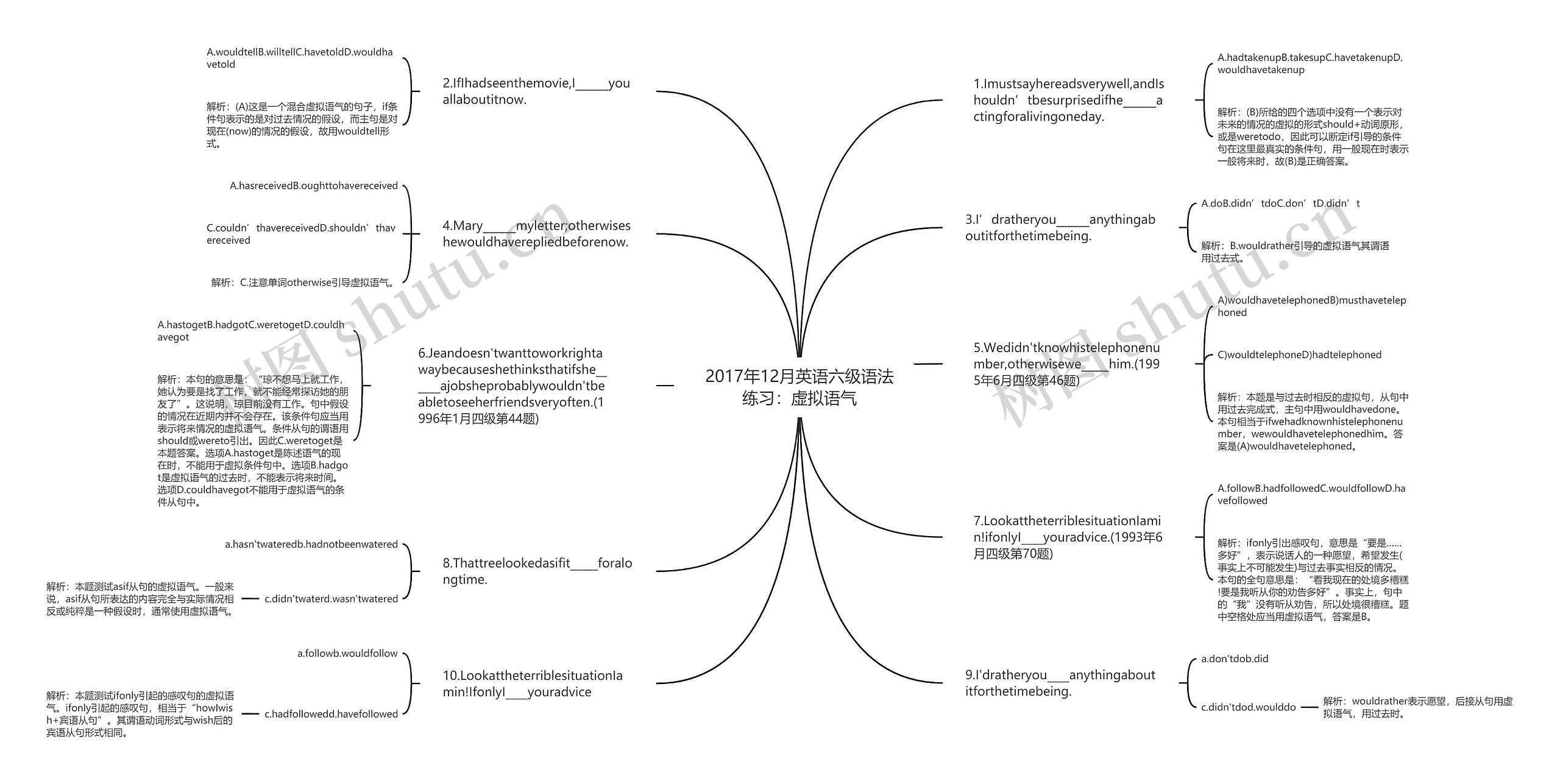1.Imustsayhereadsverywell,andIshouldn’tbesurprisedifhe______actingforalivingoneday.
A.hadtakenupB.takesupC.havetakenupD.wouldhavetakenup
解析:(B)所给的四个选项中没有一个表示对未来的情况的虚拟的形式should+动词原形,或是weretodo,因此可以断定if引导的条件句在这里最真实的条件句,用一般现在时表示一般将来时,故(B)是正确答案。
2.IfIhadseenthemovie,I______youallaboutitnow.
A.wouldtellB.willtellC.havetoldD.wouldhavetold
解析:(A)这是一个混合虚拟语气的句子,if条件句表示的是对过去情况的假设,而主句是对现在(now)的情况的假设,故用wouldtell形式。
3.I’dratheryou______anythingaboutitforthetimebeing.
A.doB.didn’tdoC.don’tD.didn’t
解析:B.wouldrather引导的虚拟语气其谓语用过去式。
4.Mary______myletter;otherwiseshewouldhaverepliedbeforenow.
A.hasreceivedB.oughttohavereceived
C.couldn’thavereceivedD.shouldn’thavereceived
解析:C.注意单词otherwise引导虚拟语气。
5.Wedidn'tknowhistelephonenumber,otherwisewe_____him.(1995年6月四级第46题)
A)wouldhavetelephonedB)musthavetelephoned
C)wouldtelephoneD)hadtelephoned
解析:本题是与过去时相反的虚拟句,从句中用过去完成式,主句中用wouldhavedone。本句相当于ifwehadknownhistelephonenumber,wewouldhavetelephonedhim。答案是(A)wouldhavetelephoned。
6.Jeandoesn'twanttoworkrightawaybecauseshethinksthatifshe______ajobsheprobablywouldn'tbeabletoseeherfriendsveryoften.(1996年1月四级第44题)
A.hastogetB.hadgotC.weretogetD.couldhavegot
解析:本句的意思是:“琼不想马上就工作,她认为要是找了工作,就不能经常探访她的朋友了”。这说明,琼目前没有工作。句中假设的情况在近期内并不会存在。该条件句应当用表示将来情况的虚拟语气。条件从句的谓语用should或wereto引出。因此C.weretoget是本题答案。选项A.hastoget是陈述语气的现在时,不能用于虚拟条件句中。选项B.hadgot是虚拟语气的过去时,不能表示将来时间。选项D.couldhavegot不能用于虚拟语气的条件从句中。
7.LookattheterriblesituationIamin!ifonlyI____youradvice.(1993年6月四级第70题)
A.followB.hadfollowedC.wouldfollowD.havefollowed
解析:ifonly引出感叹句,意思是“要是……多好”,表示说话人的一种愿望,希望发生(事实上不可能发生)与过去事实相反的情况。本句的全句意思是:“看我现在的处境多糟糕!要是我听从你的劝告多好”。事实上,句中的“我”没有听从劝告,所以处境很糟糕。题中空格处应当用虚拟语气,答案是B。
8.Thattreelookedasifit_____foralongtime.
a.hasn'twateredb.hadnotbeenwatered
c.didn'twaterd.wasn'twatered
解析:本题测试asif从句的虚拟语气。一般来说,asif从句所表达的内容完全与实际情况相反或纯粹是一种假设时,通常使用虚拟语气。
9.I'dratheryou____anythingaboutitforthetimebeing.
c.didn'tdod.woulddo
解析:wouldrather表示愿望,后接从句用虚拟语气,用过去时。
10.LookattheterriblesituationIamin!IfonlyI____youradvice
c.hadfollowedd.havefollowed
解析:本题测试ifonly引起的感叹句的虚拟语气。ifonly引起的感叹句,相当于“howIwish+宾语从句”。其谓语动词形式与wish后的宾语从句形式相同。

